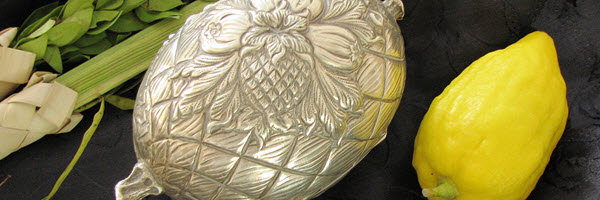

Dear Friend,
Here is a dismal, if anecdotal, indicator of the state of Jewish education: whenever I have asked, I have found that the overwhelming majority of Jews don’t know the phrase “nothing new under the sun” comes from the Bible.
In fact, it’s a central motif in the book of Kohelet, or Ecclesiastes, an enigmatic megillah we read during the forthcoming holiday of Sukkot.
The choice of Kohelet for Sukkot is a curious one. Sukkot is supposed to be the most joyous festival in our calendar, and yet, on it we read a book that starts with this uplifting phrase: “Utter futility, utter futility, everything is futile.” Gulp. Chew on that, shiny happy people. Solomon, to whom Kohelet is traditionally attributed, must be Judaism’s most infamous party-pooper.
Kohelet goes on to present a bleak vision of life. Man has no profit from “all his travails under the sun.” The author tells us that he became wealthier than any other person and discovered that “this, also, was utter futility;” then he dedicated himself to acquiring wisdom and knowledge, but realized “the more you know, the more you suffer,” and that humans are too insignificant ever to learn all there is to know and even if we did, the wise will die just as the ignorant do. The king also devoted himself to pleasures and merriment, he says; he womanized, built fragrant gardens, celebrated banquets, and engaged in entertainment of all types—but that also leaves him empty, for “that, also, is vanity and utter futility.” Every endeavor he undertakes looks useless, like “chasing the wind.” Death, he muses, awaits all: the rich and the poor, the sage and the ignorant, the downhearted and the joyful.
Kohelet comes to the grim conclusion that the universe is completely indifferent to Man; the sun rises and then “glides back to where it rises;” the wind is “ever turning” without any consideration for us little humans. All that was will be again; the rivers will keep flowing as they always did and the planets will orbit in space as they did eons ago. Indeed, “there is nothing new under the sun.”
This year we may appreciate more than ever what Kohelet means. Seeing a renaissance of intolerance, Nazis marching in the streets of America, the demonization of Israel and Jews, the awakening of nationalist ghosts of the past and even the specter of nuclear war, we may be justified in thinking “there is nothing new under the sun.” We feel that “the arc of the moral universe” which is supposed to “bend towards justice” may not be an arc at all, but a nightmarish circle in which we regularly repeat the horrors of the past.
Why did the rabbis of antiquity make the curious choice of Kohelet as a reading for Sukkot? Why such a dismal book for such a joyous festival? There’s no obvious association (as there is, for example, with reading Esther on Purim, Lamentations on Tisha b’Av, or the spring-themed Song of Songs on Passover). The traditional explanations are, frankly, not very powerful. Some suggest that since all the “Five Megillot” are read on holidays throughout the year and Kohelet didn’t have any particular holiday, it unceremoniously got stuck with Sukkot. Others cherry-pick a happy-sounding quote from Kohelet which says people must “rejoice in their lot, eat, drink, and be merry” to connect it to the joy of Sukkot; still others say precisely the opposite: Kohelet is meant to produce a sobering effect lest we get too carried away with the joy of the holiday.
There has to be, I believe, something deeper.
Kohelet is a book with clear influences from stoic and skeptic philosophy, influences that are in many ways contrary to central tenets of Judaism. It was risky even to include it in the biblical canon, let alone mandate its reading on the most popular holiday of the calendar year. Something tells me that if the debate were whether selections for the TaNaKH were occurring today, the rabbis would decline to include it for fear of offending a donor who might not like it. So why take the risk? What’s so valuable in Kohelet that justifies the risk of contradiction, confusion and angry donors?
Maybe the answer is in an obvious yet hidden contradiction: the book’s content is challenged by the book’s existence.
If, as the author insists, nothing has any lasting meaning, if everything is futile, if no effort is justified, why write the book? Why invest the effort of putting quill to parchment if you’re truly convinced “man has no profit from all his travails under the sun?” Why even bother to communicate this message to other people at all?
Yet Kohelet does reach out to us. He does care enough to share his bleak message with the reader. By doing so he betrays his belief in at least one worthwhile thing: communicating with another human being.
Seen in this light, Kohelet becomes a perfect fit for its holiday. Sukkot is the holiday of the ingathering, both of crops and of people, the time in antiquity when all the people would come together to listen to the law, a time in which we discover the brotherhood and sisterhood of all Jews, a time to rejoice together even with those who are different from us, just as the Four Species are waved together. It’s the time to reflect, as Kohelet does, that “one destiny awaits us all” and that everyone around us feels the same fears, the same anguishes and the same anxieties we do. We are all united by the greatest equalizer of all: death.
Cheerful that’s not. But it’s effective. It makes us understand we are one in our fragility, like the fragility of the sukkah, and those we dislike are fighting our same uphill battle against the futility of it all.
Communicating with the other, connecting with them, may be the only thing that transforms a senseless life into one worth living. Kohelet laments all he did except what he did for others. He accumulated wealth for himself and finds it futile; he accumulated wisdom for himself and regrets it; he enjoyed food, wine, and women for his own pleasure and he laments it. In the ultimate calculation, everything we do just for ourselves is vacuous. Kohelet’s final act, however, is focused on the outside: writing his book, communicating with others. That is what finally gives meaning to his life.
So yes, Kohelet can put a check on our joy, it can help us remember not to paint a naïvely rosy picture of the world. But it can also tell us that when all seems senseless, we still have each other. It can tell us that despite feelings of despondency and futility, there’s meaning to be found in including others in our lives, working for them and with them for a better future. In these times of rampant egotism, selfishness and consumerism, Kohelet is a poignant reminder that only what we do for others can transform a vain existence into something genuinely new and unique. Doing things for others is a rebellion against the senselessness of an indifferent world. Kohelet reminds us that only another person can fulfill our deepest human need: the need of being needed.
So maybe in Kohelet’s litany of futility, there’s a gauntlet thrown down before us, a challenge, a call to action: prove me wrong, begs Kohelet. Show me that there is something new under the sun. Show me that there’s something that only you can bring to the life of others. Show me that life is not an unmoving, Sisyphean torment but a journey which can lead us to wonders when other people are its destination. “The end of the matter, when all has been heard:” making a difference to others and changing the world is all that counts, “for that is everything for humanity.”
Chag sameach!
Andrés Spokoiny, president and CEO
Jewish Funders Network

